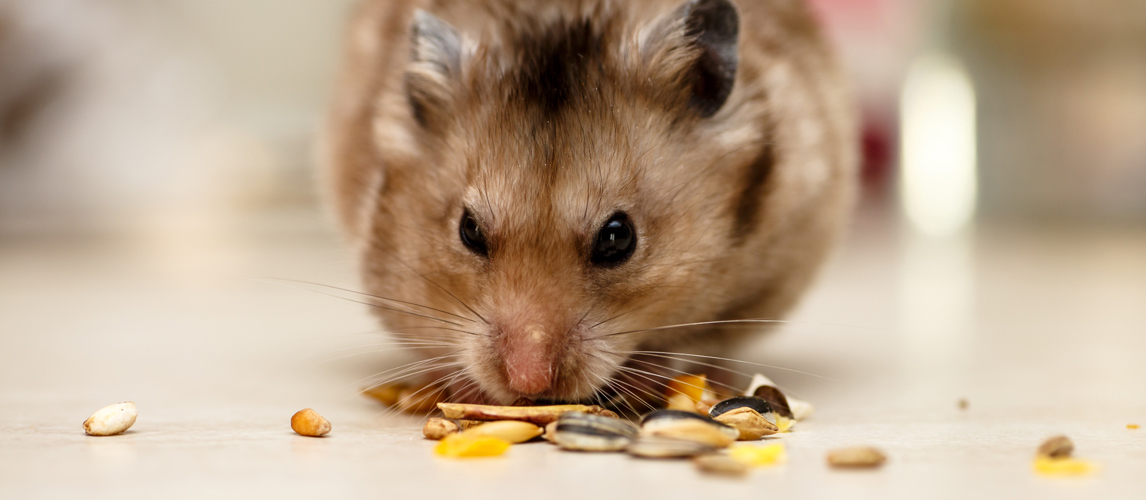
The Best Ferret Food in 2022
- Home
- Other animals
- Small Animals
It can be tough to know what to feed your pet, especially if you have a more unusual one like a ferret. But getting the nutritional balance is so important in ensuring that they live a long and happy life. So, whether you are just getting one of these pets for the first time or you simply need a little more information on what to offer them, we are here to help with our buying guide of the best ferret food out there.
The Best Ferret Food
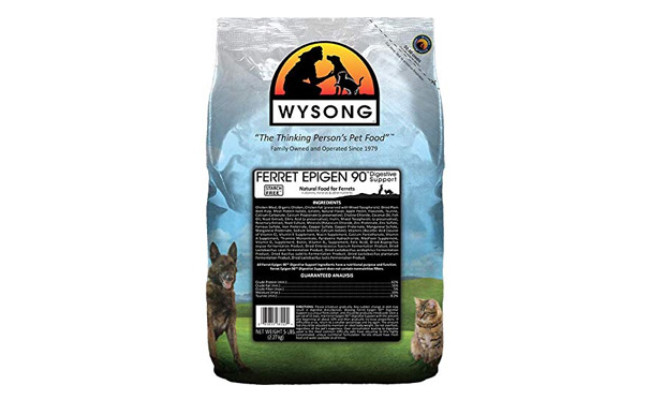
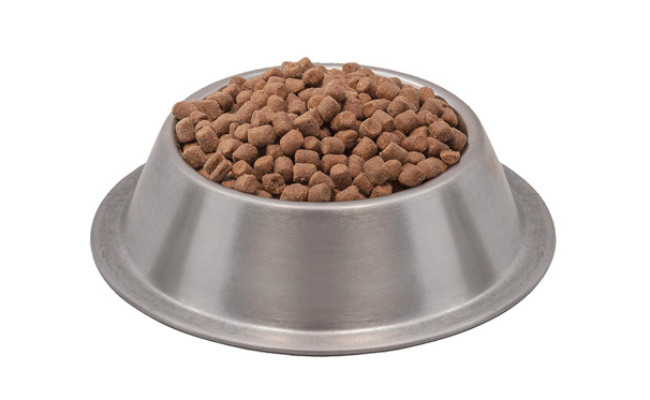


Our number one choice is this very popular dry ferret food, which contains a high level of meat content – exactly what a carnivorous creature needs. Also, there are no starch ingredients contained in the food, meaning that it is purposely down on ‘filler’ content. But it is full of vitamins, minerals, probiotics, and prebiotics.
The food has been specially formulated to support the specific digestive health of your pet ferret. At the same time, it also has the delicious flavor that ferrets crave, so there will be no complaints when dinner time rolls around.
Supports good digestive health and stool consistency
High level of meat content
Enhanced prebiotic effect
Starchless content
- Brand: Wysong
- Weight: 5 pounds
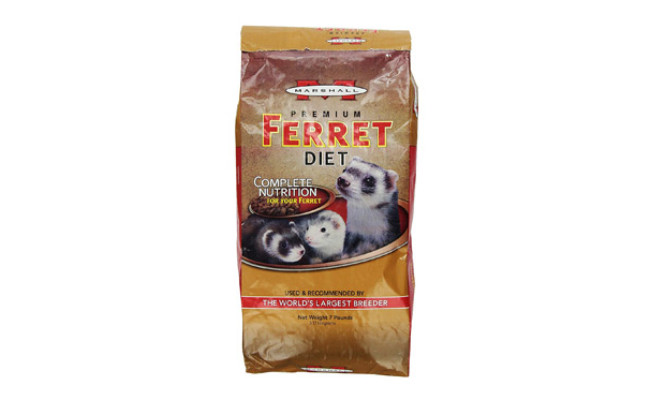
A lot of ferret owners rely on this popular brand of food for their little furry friend. One of the biggest claims to fame of Marshall ferret food is that it is fed and recommended by the world’s largest ferret breeder. Designed to provide total nutrition to ferrets of all life stages, it is rich in important ingredients like omega 3 and 6 fatty acids.
Marshall have formulated this food with plenty of fresh meat based on the understanding that ferrets are largely carnivorous creatures. Some say that it is the unique low temperature process that makes these treats so popular with ferrets.
Well-established and top-selling brand
Contains plenty of meat-based protein
Plenty of Omega 3 and 6 fatty acids
Unique low temperature production process
- Brand: Marshall Pet Products
- Model: FD-015
- Weight: 6.99 pounds
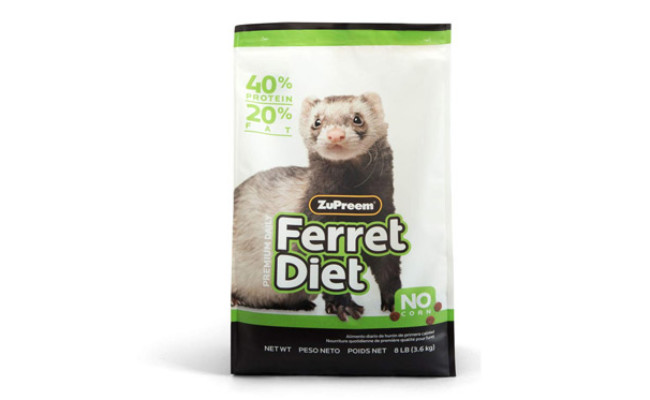
Number three on our list is this premium daily food for your ferret diet, which contains plenty of protein but no fat content. Ferrets sometimes suffer from tummy trouble, but this food is made specifically to be highly digestible. Real egg and chicken make up two of the main ingredients that it contains. No additional supplements are required, so it can easily form the cornerstone of your ferret’s diet.
High protein content
Recommended by vets and top feeders
Provides balanced nutrition
No supplements required
- Brand: ZuPreem
- Model: 230058
- Weight: 8 pounds
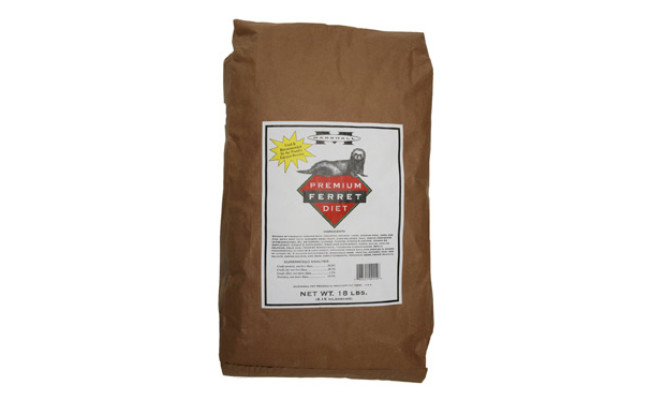
Another premium ferret food from best-selling brand Marshall, this one is designed to offer the type of balanced diet that your pet needs. A lot of customers have ranked it highly, and this opinion has been backed up by the world’s largest ferret breeds, who have also given it their seal of approval. It is rich in important ingredients such as omega 3 and 6 fatty acids. Chicken by-products and herring meal make up two of the central ingredients.
Full of meat-based protein
Fresh ingredients used
Popular taste
Top-selling brand
- Brand: Marshall Pet Products
- Model: FD-155
- Weight: 18 pounds
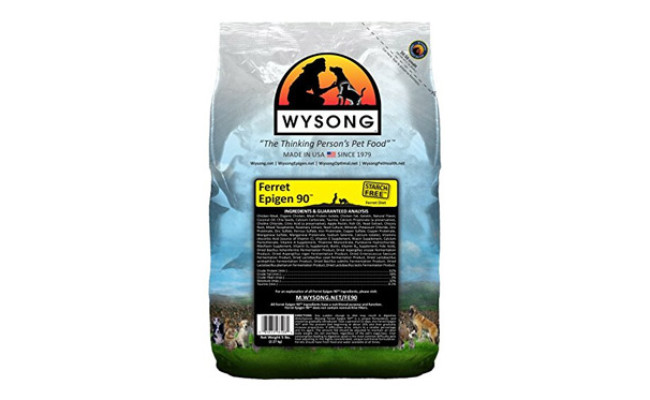
When you are choosing ferret food, it is important that it is dense in protein and nutrients. Well, this Wysong ferret food contains as much as 90% meat ingredients, while keeping the fat content down to 18%. The whole point of the design is that it matches the food your ferret would traditionally enjoy in the wild.
As well as all the fatty acids that you would want food of this type to contain, there is also plenty of other good stuff including vitamins, minerals, antioxidants, probiotics, and prebiotics. Plus, this is a trusted brand that has been around since way back in 1979.
High levels of meat and protein
Nutritionally dense
Rich in essential fatty acids
Highly regarded brand
- Brand: Wysong
- Model: 858110
- Weight: 5 pounds
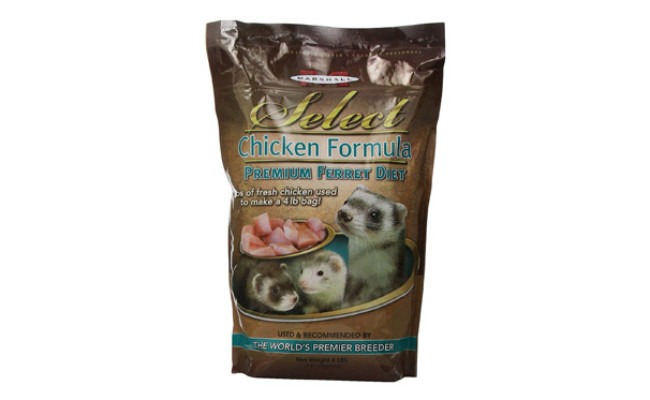
Another premium ferret food from Marshall, this one is packed with fresh chicken, which is well known to be one of the favorite food items of ferrets. As well as using fresh ingredients, the brand is well-known for processing everything at low temperatures, which is a central part of why so many ferrets enjoy this particular brand. As we mentioned earlier Marshall product review, the products are used and recommended by the world’s premier breeder.
Contains chicken-based protein sources
Low temperature processing
Protects nutritional integrity of ingredients
Full refund guarantee if not satisfied
- Brand: Marshall Pet Products
- Model: FD-362
- Weight: 4 pounds
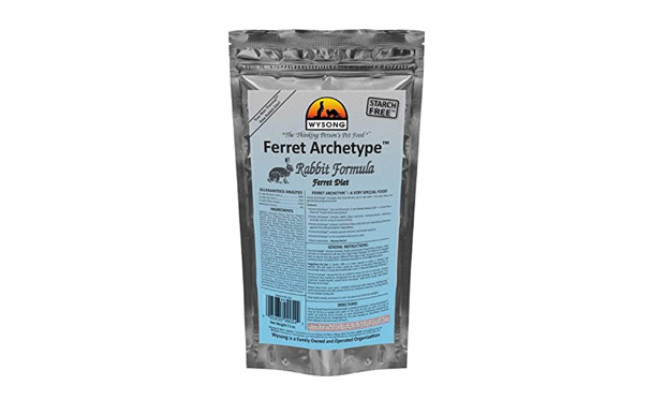
Cooking foods at low temperatures has been shown to protect its nutritional integrity, which is why Wysong does it. As we have already discussed, ferrets are carnivores, which is why this food contains primarily meat, and does not contain starch, which can contribute to glut diseases in your animal.
A vast array of micronutrients are all included right in the bag. Both the natural protein and fat contents are high. A lot of manufacturers add non-nutritional additives as a way of lengthening the shelf life of their food, but Wysong pride themselves on not packing their food with these – leaving your ferret eating something more akin to what they would in the wild.
Not heated above 118 Fahrenheit for nutritional integrity
Meat based and starch free ferret food
Contains a host of nutritional benefits
Includes healthy fats
- Brand: Wysong
- Model: 858052
- Weight: 8 ounces
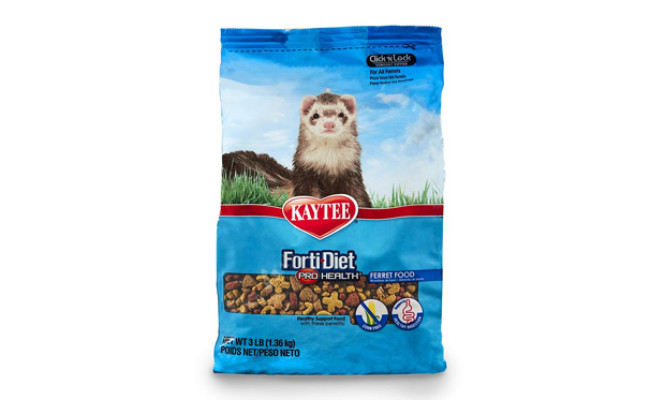
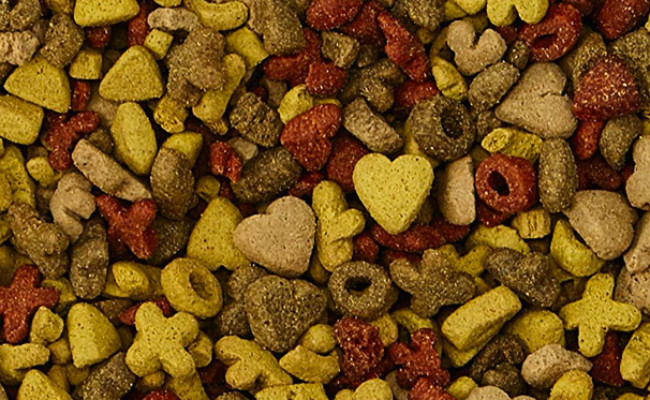


One of the main important reasons why ferrets need to eat a diet of hard and crunchy food is that the act of chewing promotes good dental health. The pieces of this dry ferret food are especially large and crunchy, so Kaytee has the dental health of your pet firmly in mind.
On top of the dental benefits that the food provides, it also contains a strong mix of probiotics and prebiotics to support the digestive health of your animal. And just as you would want, it has been made to be easy to feed to your pet.
Contains probiotics and prebiotics to support digestive health
Rich in natural antioxidants
Larger, crunchies pieces support good dental health
Brand has over 150 years of nutritional experience
- Brand: Kaytee
- Model: 100502090
- Weight: 3 pounds
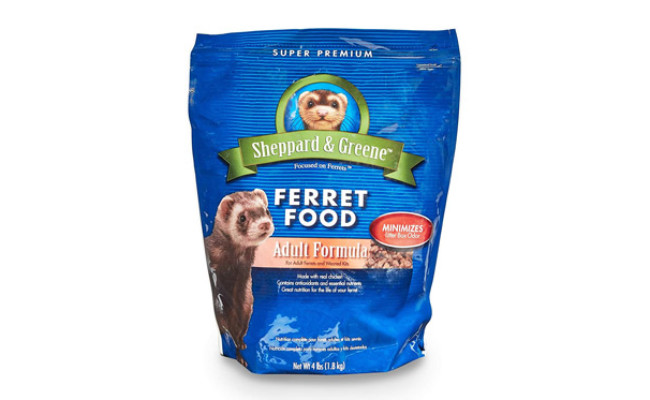
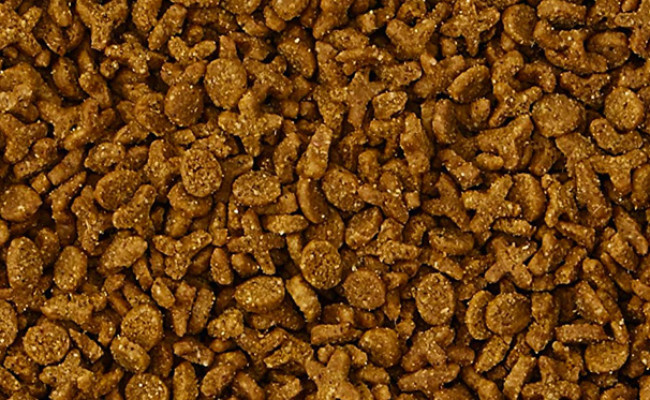


When you are choosing a good ferret food, you should always look at the primary ingredient to gauge its quality. This one contains real chicken as the primary ingredient, but it is also packed with antioxidants and essential nutrients, which contribute towards your pet enjoying a good diet.
A couple of the other benefits that this brand promises includes a reduction in the shedding of your ferret’s coat and minimized hairballs. Many past customers have described the benefits that the food provides for their little fluffy friend.
Primary ingredient is real chicken
Promotes a healthier immune system
Reduces shedding and hairballs
Full of antioxidants and other essential nutrients
- Brand: Farnam
- Model: 100034302
- Weight: 4 pounds
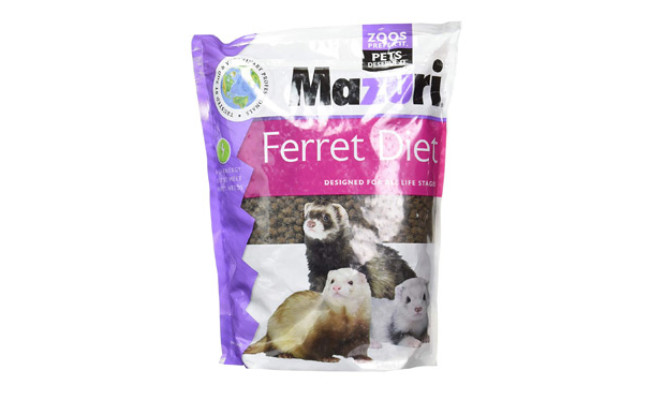
Coming at the end of the list, we have this ferret food that contains a range of animal-derived proteins to promote the healthy functioning of your little ball of fluff. Starch levels are below 15%, which is better for creatures which only eat meat in the wild.
Digestion can be an issue in some ferrets, but this food has been reported as easy to stomach by many ferrets. It also has a palatable taste that has proven popular. Other beneficial aspects include the fish oil, which acts as an Omega-3 fatty acid source. Also, there is natural vitamin E and probiotics.
Designed for ferrets in all life stages
Highly palatable and nutrient dense
Contains animal-derived proteins
No ferret supplements required
- Brand: Mazuri
- Model: 727613004743
- Weight: 5 pounds
Best Ferret Food Buying Guide & FAQ
The next section is our buying guide, where we aim to answer some of the burning questions that you may still have about ferret food. Ferrets are interesting animals that require a very specific type of diet – and this is not something that you should mess with heavily. Often, you will cause some sort of digestive upset – or something altogether more serious. The best type of food to offer your ferret is food that has been specially formulated for them. Gone are the days when you would have to rely on kitten food. As the popularity of owning a ferret has increased, so too have the number of good options of food out there. So, let’s go into some more detail right here and now.
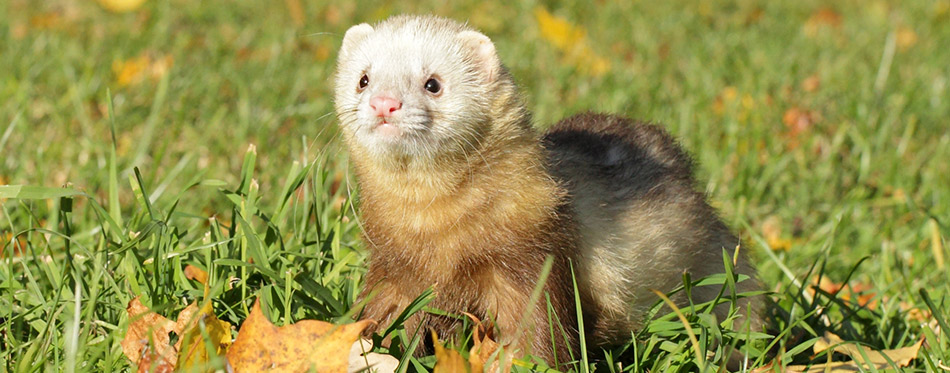
What Do Ferrets Eat
The first thing that you should know about ferrets is that they have a high metabolic rate. This means that they should enjoy as many as 10 small meals on a daily basis. Like cats, they are strictly carnivorous creatures, so they need a protein-rich diet. This can be provided by food pellets, which you should be able to get at your local pet store. But don’t assume that they are all created equal. You need to familiarize yourself with the ingredients and what is best. The number one ingredient should be a real meat source like chicken or lamb.
If you find that your local pet store does not stock the necessary ferret food, you can offer them kitten food, which contains a higher source of protein than the adult food. But you will also need to give them fatty acid supplements too. Another way to go is to offer your ferret some homemade food too. Cooked or raw chicken provides a good accompaniment to the pellets. But remember that dry food should be a staple as it helps to protect their dental hygiene.
Again, ferrets are similar to cats in that they usually only like eating a single type of food. But if you try to offer them a bit more variety, you can help to broaden their palette a bit. Try mixing in a bit of new food in so that it doesn’t prove to be too much of a shock.
As for the pellet shape, you should try favouring rounded treats as these are less likely to jab your pet’s mouth than the more angular shapes.
Just like other pets, ferrets love getting a treat or two from time to time. Cat treats, cooked meat, and eggs are all viable options. Never give them anything that has been made for dogs.
Food to Avoid Feeding Your Ferret
It is just as important to know what foods you should avoid feeding to your ferret as the ones that you should. First, you should avoid anything that includes high levels of complex carbohydrates. Fruit and veg, dairy, or anything with sugar fit into this list. This all comes back to the carnivorous nature of ferrets, which means that their digestive tracts are not built to process this type of food. While it may be tempting to offer a bit of chocolate or a lick or ice cream, you need to bear in mind that it is likely you are doing more harm than good.
How to Feed Your Ferret
Feeding your ferret shouldn’t prove to be massively different to feeding any other animal that you may own. Just like all creatures, ferrets need to enjoy a balanced diet to increase their chances of enjoying a long and healthy life. Obviously, what constitutes a balanced diet varies from animal to animal, but things have certainly got a lot better in terms of the quality of ferret food that is now being produced. In the past, ferret owners had to rely on kitten food, which offered generally the same nutrients that ferrets require, but not the exact ones. However, in recent times, ferrets have become more and more popular as a pet, which is why the variety and quality has taken such as significant upturn.
As a rule of thumb, you should be looking for at least a couple of different types of food that prove to be nutritionally satisfying to your pet. Ferrets are well-known as being fussy eaters, and if you only get them used to a single type of food, there is every chance that they will not eat anything else if it suddenly becomes unavailable. If you have your ferret from a young age, this is the ideal time to do a bit of experimentation regarding their food. One option is to blend two foods together as this will stop the ferret from becoming dependent on only one.
Ferrets are carnivores, meaning that a dietary plan based on animal protein needs to form the cornerstone of what they are eating on a regular basis. As obligate carnivores with no cecum, ferrets are not able to digest vegetable proteins, nor utilize the nutrients that are found within. This can be somewhat of a shock to humans who are regularly taught about the importance of eating a protein-rich diet, and they will mistakenly try to give their ferret vegetables to eat. This is certainly a mistake that you should avoid making yourself. When you are looking at ferret foods, you should look for products which list at least three of their main six products as meat. Be wary of foods that list it as a vegetable or some other type of plant matter.
Another dietary point to consider about ferrets is that they have very short digestive periods. After your ferret has eaten a particular type of food, it will be digested in only around three or four hours. Due to this fact, it is so important that ferret diets consist largely of protein and fat – at least a third of the former and a fifth of the latter should make up their total diet. Ferrets are creatures that tend to suffer from a lot of digestive issues, and one of the central reasons for this is that their digestion is so quick that the tract does not have time to extract the things that it needs. You don’t want to give your pet anything that is going to speed things along even further.
You should also ensure that fresh water is always available for your ferret. Make sure to change it on a daily basis.
When a ferret is well-fed, you should see positive signs of life emanating from them. This means a glossy coat, clear eyes, and a supple body. In terms of their personality characteristics, they should show themselves to be alert and playful – and more than a little curious!

What Do Baby Ferrets Eat
Caring for your baby ferret comes along with its own individual set of responsibilities – and diet is obviously a primary concern. Young ferret kits can be weaned at around six weeks old. At this point, they need some proper nourishment to aid in their continuing development. High-quality ferret food is the best thing to give your little kit. Unlike other pets, baby ferrets can eat the same food as adults after they have been weaned. One trick that you can use to make the food easier to eat for mouths and teeth that are still developing is to soak the food in warm water for around five or 10 minutes.
While some ferret owners still rely on kitten food for their pet, this is actually not the best option as the diets and requirements are different between the two animals. Ferrets need to consume a lot of protein and fewer carbs than cats. This all comes back to ferrets having such quick digestion. Feeding your ferret the wrong thing can throw their system completely out of whack. While ferret food tends to be more expensive than cat food, they eat such small amounts that it is bound to last for a lot longer.
A protein-rich diet will encourage better growth and reduce the risk is urinary tract infections (UTIs). Avoid offering any treats until the time comes to housebreak your ferret. While young ferrets may love the taste of milk and ice cream, it is only going to antagonize their stomach and result in diarrhoea. As for sugary treats, these are also not good as they could result in pancreas problems further down the line.
Best Ferret Food FAQ:
Q: How to switch to a new food?
A: Ferrets are notoriously fussy eaters, so switching their food can feel like a massive upheaval and challenge. Perhaps you want to upgrade to a brand with more nutritional benefits, but your ferret is not having any of it. Well, as we mentioned earlier, if you mix the ferret food all along, this helps your pet get used to different tastes. But if you are making a complete transition, you are going to need to do so gradually. Otherwise, this could lead to a host of gastric disturbances including vomiting, diarrhea, and lethargy. Bear in mind that switching food is likely to be more difficult for ferrets that are over a year old. In terms of the length of the transition phase, you should give it at least a week. All you need to do is gradually decrease the quantity of the old kibble and increase the quantity of the new.
There are a few other techniques that can help out too. First, you can try hand feeding some of the new food to your ferret. This has the other positive benefit of improving the bond between the two of you. If you mix the old food and new food in a bag and put it in the fridge for around a day, this helps to blend the flavors and may make the transition that little bit easier. Another way of blending the two is by adding a dash of water to them. You could also try using the new ferret food as a treat, which may help to ‘trick’ your pet into liking it more quickly.
If you are at all concerned about the process or don’t feel like it is going as well as it could be, you should consult your vet to get a better picture of what to do. You also need to take special care if your ferret already suffers from some sort of dietary issues.
Q: Can ferrets eat dog food?
A: No. Ferrets should never be fed dog food. The digestive system of a ferret does not match the digestive system of a dog, who are better placed to be able to enjoy a wide variety of different food stuffs. Remember that dogs are omnivores, while ferrets are carnivores – putting them in totally different categories. If you own both a dog and a ferret, you should find a way of keeping their food entirely separate from one another.
Q: Can ferrets eat fruit and vegetables?
A: No. Ferrets are obligate carnivores who requires strictly meat-based diet. They do not have the digestive means to process fruits, greens, or nuts. Any type of sugars and sweets are a bad thing as they can lead to tooth decay and other issues. Some ferret owners offer their pet things like bananas and raisins, which may be okay in small quantities, but they should not be covered in sugar – and you certainly shouldn’t overdo it. Their short digestive tracts mean that they do not respond well to fiber. So, as a rule of thumb, you should avoid giving your ferret fruit and vegetables. You may think that it will do them good, but the truth is that it probably won’t.
Q: Can I feed my ferret human food?
A: You shouldn’t feed your ferret most types of human food, but there are one or two exceptions. These include small pieces of cooked meat and raw eggs. However, this is not something that you should overdo. You should stick to their usual diet or dry kibbles as much as possible. If you are not sure about whether or not you can offer a certain type of food to your ferret, you should certainly err on the side of caution and consult with your vet beforehand.
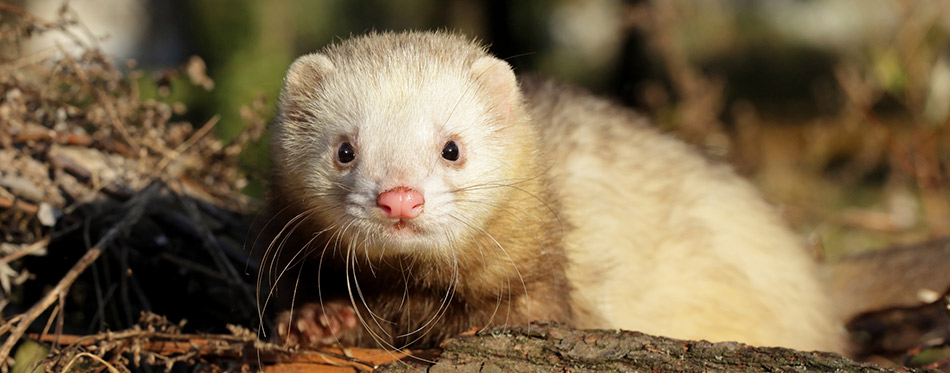
Our Top Pick
Returning to our number one choice on the ferret food list, this one has received hundreds of positive customer ratings, and we have also decided that it should be top of the tree. The meat content is very high, which is exactly what ferrets need to enjoy a long and healthy lifestyle. Many ferret owners have reported that their pet goes crazy over the natural taste and flavor, which mimics the type of thing that they would have once enjoyed in the wild. It also contains a host of nutrients and other beneficial substances.
Sources:
- Roser, R J, Food Habits Of The Ferret At Pukepuke Lagoon, Taylor & Francis
- Judith A.BellDVM, MSc, PhD, Ferret Nutrition, ScienceDirect
Related Posts


